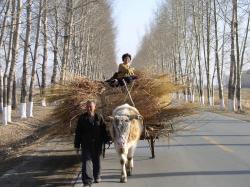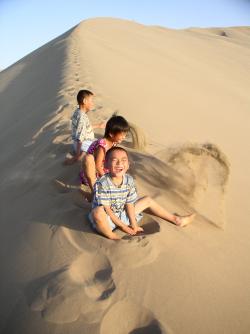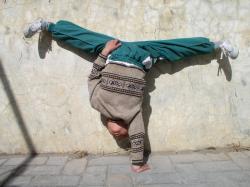The Real Face of China
 How did you break down the barrier between you and the local people to get such open photographs?
How did you break down the barrier between you and the local people to get such open photographs?
Honestly, I think it was the camera itself that helped break down those barriers. The people saw that I was genuinely interested in them, and were flattered to have their 'ordinary' lives (and I say that with utmost respect – my book is a tribute to the ordinary) immortalised on film.
Did you ever have any run-ins with the authorities while on the road?
I was nearly arrested by plainclothes police in small-town Hunan for photographing a peasant riot unless I deleted my photos, although some of those pics managed to escape and appear in the book, and I have been threatened and intimidated numerous times by other authorities simply because I had a camera in my hand.
 Tell us about your accidental trip to North Korea.
Tell us about your accidental trip to North Korea.
My brush with the Democratic People’s Republic of Korea occurred on Changbai Mountain, one of China’s most scenic mountains any other time of year except when I happened to arrive: in the dead of winter. Having climbed the mountain to reach Heaven Pool, I decided, with another American I had met on the way up, to take a morning stroll on the frozen lake. We had almost reached the other side when two silhouettes emerged on the blindingly white horizon. A moment later we were facing the business ends of two submachine guns held by North Korean border-patrol soldiers. Needless to say, we were no longer in China. The soldiers demanded to see our passports and motioned to us in no uncertain terms what happened to Americans trying to sneak into their country. As the soldiers discussed our fate in rapid-fire Korean, I cautiously offered them a tin of Communist-rolled Cuban cigarillos with a big smile. They replied in kind by making us run for the border – four kilometres in knee-deep snow back to the Chinese side of Changbai Mountain.
You travelled for one year solo and another year with your Chinese girlfriend. How did her presence affect the pictures you took?
The truth is having my girlfriend at my side opened up more doors than I would have ever been able to alone. She really helped me discover new places and learn more about [them]. I wrote in the acknowledgement section of my book that CHINA: Portrait of a People would only be half of what it is without her.
What one thing could you not live without while on the road?
Books. My pack was half-filled with books. It was so heavy not even the bus guy could lift it up onto the roof. When I finished those books, I would just buy whatever was on the shelves of Xinhua; I think I’ve read Tess a dozen times since living in China!
 What are your plans for the future?
What are your plans for the future?
After four straight years in China I went to Tokyo for a year to teach and save money. I used that money to travel across India all last year to start my next photo book. But at present I am back in China for a much-needed break. I am staying with [my girlfriend] and her family in rural Jiangsu, so I get to learn about true village life, which is a nice change from big-city living.
Tom Carter will be speaking at M on the Bund on 8 August at 4pm. China: Portrait of a People is available for purchase online at Blue Fountain Books. Web: www.51eng.com/en

